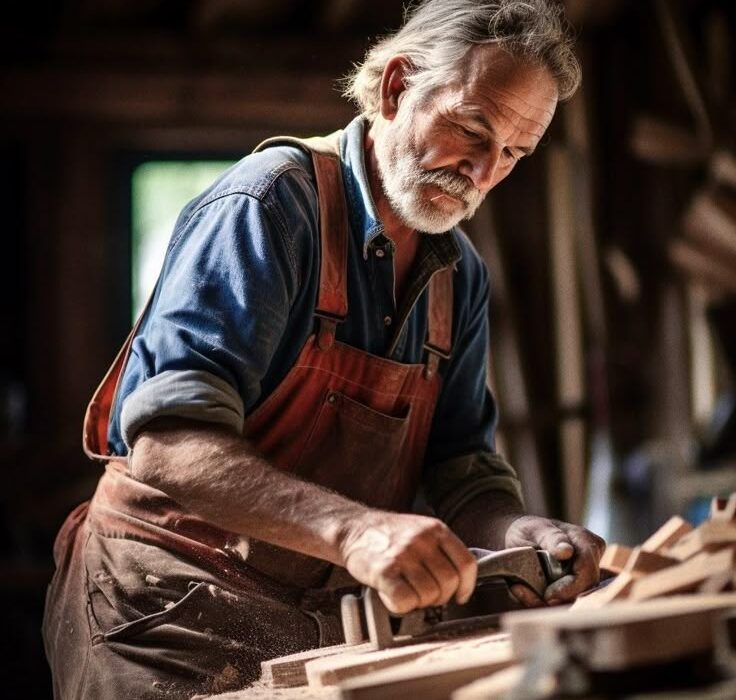Ravi was once the owner of a successful furniture business in the heart of the city. His carpentry was known not just for its quality but for the soul he infused into every chair, table, or bed he crafted. For nearly 25 years, he built a life of comfort for his family—his wife, Meena, and his son, Arjun. But fate, as unpredictable as it is, had other plans.
It all started with a fire.
One scorching summer afternoon, a short circuit in the warehouse sparked a blaze that engulfed his entire workshop. All the wood, the machines, and the finished pieces ready for delivery—turned to ash in a matter of hours. Worse, Ravi had canceled his insurance just a month before in an effort to reduce expenses. He watched helplessly as decades of work went up in smoke.
What remained was a pile of blackened rubble and a man broken not just financially, but emotionally.
The weeks that followed were a blur of grief and debt collectors. Ravi had taken loans for expanding the business, and without the ability to repay, everything he owned was gradually seized—their house, the delivery van, and finally, even their small family car. The family was forced to move to a tiny rented home on the outskirts of the city. For the first time in his life, Ravi had nothing to offer his family except shame.
But one evening changed everything.
Ravi was sitting alone near a barren patch of land behind their new house. The sun was setting, casting long shadows over the earth. A group of children ran past him, laughing, playing with sticks and stones. And one little girl stopped, handed him a broken branch, and said, “Make something nice, uncle. You’re a carpenter, right?”
She skipped away without waiting for an answer.
That broken branch felt heavier than it should have. It carried the weight of memories, of tools once wielded with confidence, and dreams once chased with fire. For some reason, he took the branch home. That night, he carved it with the only tool he had left—a rusted old knife. He carved a small bird, imperfect but beautiful.
It reminded him that he still had his hands.
The next morning, Ravi stood before the same barren land with a new thought. “If I can shape wood, maybe I can reshape my life too,” he whispered. And so, with borrowed tools and bruised hands, he began building a small wooden bench using discarded planks from construction sites. It took him three days. When finished, he placed it in front of their small home. The neighbors noticed. A week later, someone asked if he could make a similar one—for pay.
That was the start of something new.
Word spread slowly. Orders began trickling in. He used the little money he earned to buy better tools. He created toys, stools, shelves—each piece better than the last. Every morning, he worked with the rising sun, and every night, he dreamed not of riches, but of respect—of building something, again.
But success didn’t come easy.
Some months, there were no orders. Some nights, the pain in his hands made him cry silently. There were times when he wanted to give up, feeling it was too late to start over at his age. But then he would look at the bench, the first piece he created after losing everything, and remember that it was not about what he lost—but what he still had.
Eventually, a local café owner noticed his work and asked him to design their interiors with hand-crafted furniture. The project revived not only Ravi’s finances but his belief in himself. That café became a hub of conversations, and soon people began inquiring about the man behind its beautiful design.
Ravi never returned to his old status of owning a large business. But over the next few years, he became known as “The Backyard Carpenter.” He set up a humble open workshop where he taught carpentry to unemployed youth, ex-prisoners, and anyone willing to learn. His idea was simple—“Even broken branches can be shaped into something beautiful.”
He was invited to speak at community events, honored for his work in skill-building, and once even appeared in a local newspaper. But none of that matched the pride he felt when his son Arjun, now a software engineer, said, “Dad, you didn’t rebuild a business. You rebuilt hope—for all of us.”
One day, a journalist asked Ravi, “Why didn’t you give up? You had every reason to.”
He smiled and said, “Because one little girl gave me a broken branch and believed I could still make something. If a child can have faith in me, how can I not have faith in myself?”
- Rock Bottom is a Foundation: Ravi lost everything, but that loss became the starting point for something more meaningful. Hitting rock bottom isn’t the end—it can be the beginning.
- You’re Never Too Old to Start Over: Age, failures, and lost opportunities don’t define your future. What matters is your willingness to try again.
- Small Steps Lead to Big Changes: One small bench brought Ravi back on track. You don’t need to make giant leaps—consistent small efforts make a difference.
- Self-Belief is the Greatest Asset: Tools can be lost. Money can disappear. But if you believe in yourself, you can rebuild anything.
- Helping Others Makes You Whole: Ravi not only rebuilt his life, he chose to teach and uplift others. True success lies in sharing your strength.
The story of Ravi reminds us that life doesn’t always go as planned. But sometimes, the detour leads to the most beautiful destination. In the ashes of failure, hope can bloom again—if you choose to plant it. Whatever you’re facing today, remember: you still have your hands, your mind, your heart. And like Ravi, you too can shape a new beginning—one small piece at a time.

